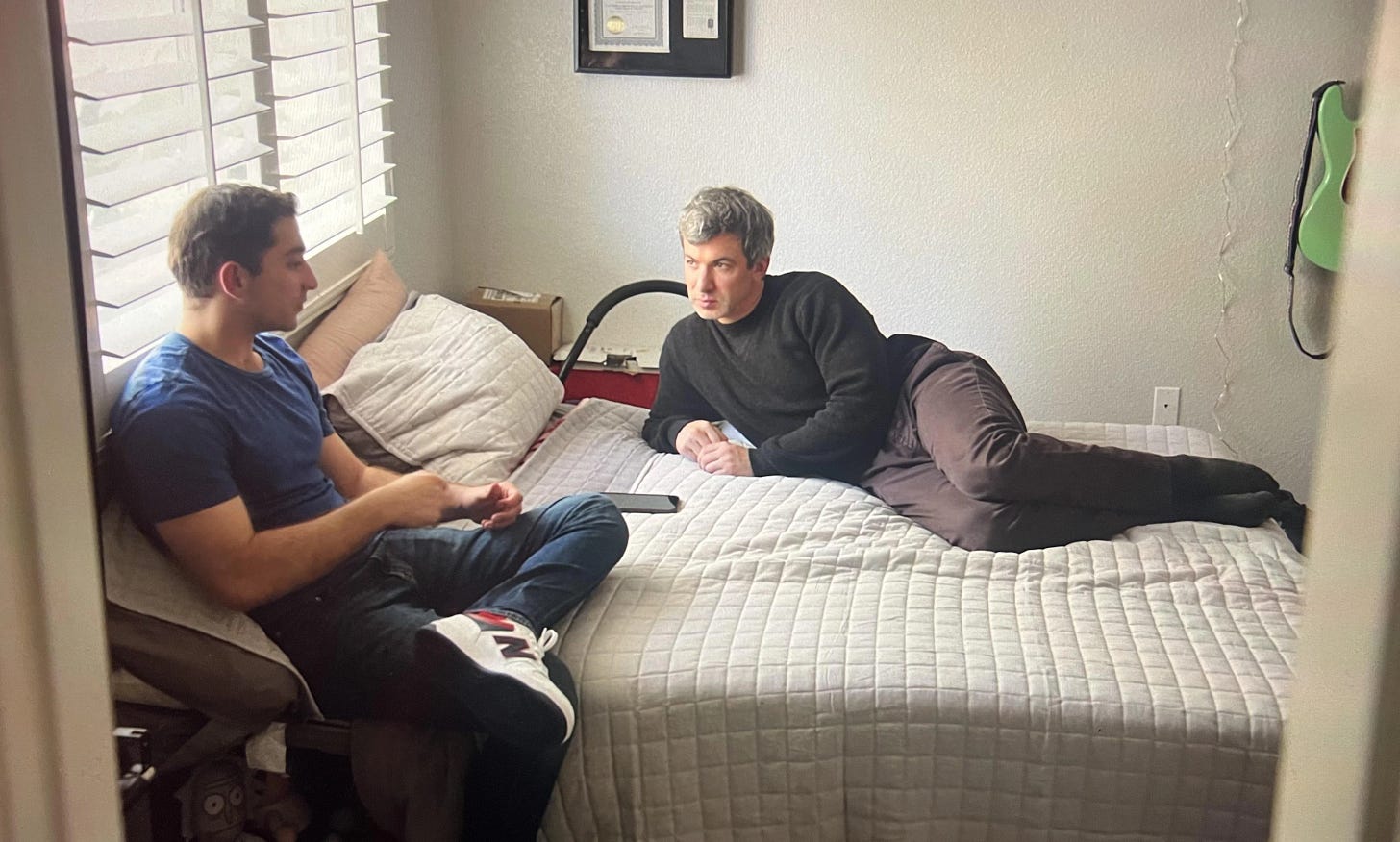The Pursuit of Male Friendship is Horrifying
With "Friendship" and "The Rehearsal," today's media representations of male friendship and sense of belonging are both labelled comedies. Why, then, are they so painful to watch?
Over the weekend, I saw the movie Friendship in theaters. I’m a big fan of Tim Robinson, not not a fan of Paul Rudd, and moreover would love to see more comedies being released. I went in with almost zero background on what the film was about. Obviously, that’s my problem. I hadn’t even watched a trailer! Still, with Tim Robinson attached to it, I figured it would be light.
That is not exactly how I would describe the viewing experience now. While there were surely funny bits, quotable lines and even several points in which I laughed out loud, I would describe Friendship’s status as a comedy as marginal at best. I see now that it’s labelled a black comedy, which seems fair. Tonally, the film struck me as something closer to slow-burn horror without the scares, or maybe even tragedy. And maybe that’s because in reality, the quest for male friendship and belonging is plagued by these same themes.
Friendship follows Craig Waterman (played by Robinson), a clueless everyman who works some shitty office job. His wife, Tami (played by Kate Mara), is recovering from cancer, probably cheating on him and really, really wants a bigger car. One day, weatherman Austin Carmichael (played by Rudd) moves into the neighborhood, and he and Craig form a quick friendship marked by tunnel exploration and mushroom foraging. Austin is inexplicably cool — he plays in a punk band and barely has a cell phone. Through him, Craig finds a newfound sense of purpose. Because he has such a cool friend, now he is cool, too. But when Austin invites Craig over the hang out with the rest of his friends, Craig is so nervous, so unsure of his coolness that he makes a fool of himself. The friends become uncomfortable. Craig is ousted from the group, and Austin cuts ties. The rest of the film follows Craig attempting to get that spark back, either by proving himself cool enough on his own or by remedying his friendship with Austin. The film does not exactly have a happy ending.
Again, I didn’t find this dynamic and its antics all that hilarious. I found them sad. But maybe that’s exactly the point. The pursuit of belonging and friendship for men is inherently uncomfortable. It’s also increasingly familiar: Craig represents a growing number of men who have no close friends. We spend so little time with the character prior to meeting Austin that we do not know whether this bothers him. He actually seems happy, but again, clueless. Meeting Austin unlocks something in him, though: as he learns he does not fit in with this friend group, he becomes aware of how he does not fit in at work and similarly within his marriage. There are all these social codes and cues that just seem to go over his head. He is at once entirely oblivious and desperate. He has no idea how he’s supposed to be.
It doesn’t seem entirely like a coincidence that this film was released just as the second season of Nathan Fielder’s The Rehearsal airs on HBO. Underneath several layers of irony, both deal with the difficulty of expressing ourselves authentically, with how thin the line between “normal social behavior” and “painfully awkward” is, with the unspoken cultural rules in place dictating how anyone is supposed to act. And both, most obviously, deal with these themes and men.
There is no other avenue, really, for men to sort these dynamics out. Even though both are comedies, they’re also both imbued with something dark. I’m unsure if their shared cringe-worthiness forces the viewer into a visceral experience of the complexity of these struggles, or instead allows them to keep them at arms length.
The problem of male friendship, however we view it, is only worsening. In 1990, only 3 percent of men reported having no close friends. Today, that figure is 15 percent. Per the Survey Center of American Life:
In the past three decades, American friendship groups have become smaller and the number of Americans without any close confidants has risen sharply. But these changes have not affected Americans equally. Men appear to have suffered a far steeper decline than women. Thirty years ago, a majority of men (55 percent) reported having at least six close friends. Today, that number has been cut in half. Slightly more than one in four (27 percent) men have six or more close friends today. Fifteen percent of men have no close friendships at all, a fivefold increase since 1990.
What’s scariest about all this is that the hurdle to overcoming the loneliness and isolation associated with the phenomenon is particularly steep, too — people with one close friend are just as lonely as those with none, and more than half of Americans with three or fewer close friends still reported feeling lonely at least once in the last seven days. If the story in Friendship were real life, Craig’s friendship with Austin wouldn’t likely have saved him even if he were able to maintain it. Instead, he’d need to find a way to enmesh himself with an extended friend group. That’s daunting for anyone.
It isn’t lost on me that Craig’s job in the movie is working for some app company designed to figure out how to make apps even more addicting. Phones themselves are a recurring motif: Craig loses or breaks several within the course of the film and also trips on toad venom in the back of a cell phone shop. Are phones responsible for Craig’s social shortcomings? Probably not. But the movie sure does make a point of highlighting them.
As the Survey Center of American Life data points out, women deal with all of this, too. Women are lonelier and more friendless than they were in the 90s, just as with men. There also aren’t a ton of recent movies or television shows dealing with this, either. But maybe there is some truth to the idea that women have more avenues to discuss their loneliness (even if it’s just on social media?) than men, or at least that they may do so without this “comedic” gloom. Women face our own set of complex, unspoken social rules, and the group politics of fitting in may in fact be even more harsh. For this, we have plenty of representation in media: look to the latest season of reality show The Secret Lives of Mormon Wives and you’ll see how fickle being in a friend group’s good graces can be. Often, it comes down to something as simple as the timing of a text message.
As for exploring the dynamics of isolation — and how isolating the pursuit of friendship can itself be — we have few current artistic frames of reference for men and women alike. Friendship and The Rehearsal ought to be considered foundational installments to what could be a new genre taking this contemporary concern on. But for all their comedic intentions, I still can’t help but watch with my hands covering my eyes.





I think the only modern depiction of male friendship with joy and acceptance at its core is Jackass. And I think that says a whole lot
Unfortunately for male friendships and loneliness there is little more off-putting than the man with poor social skills, and I use the term social skills to refer to their ability to be a friend to men or women. Lots of men have poor social skills with women, but do just fine as friends to other men. Men who lack the skills with either (the cringy, often desperate guys), are the ones everyone wants to stay away from. I don't know, maybe it's adaptive evolution that we are most turned off by the male social maladapt.
It's never a permanent sentence of course. Social skills are SKILLS. They are learned! But with our society increasingly losing its social capital, and more of our lives dominated by isolationist activities like video content, video games, or doom scrolling the number of men we're producing with no social skills keeps rising, and the opportunities they have to practice and develop good social skills is falling.